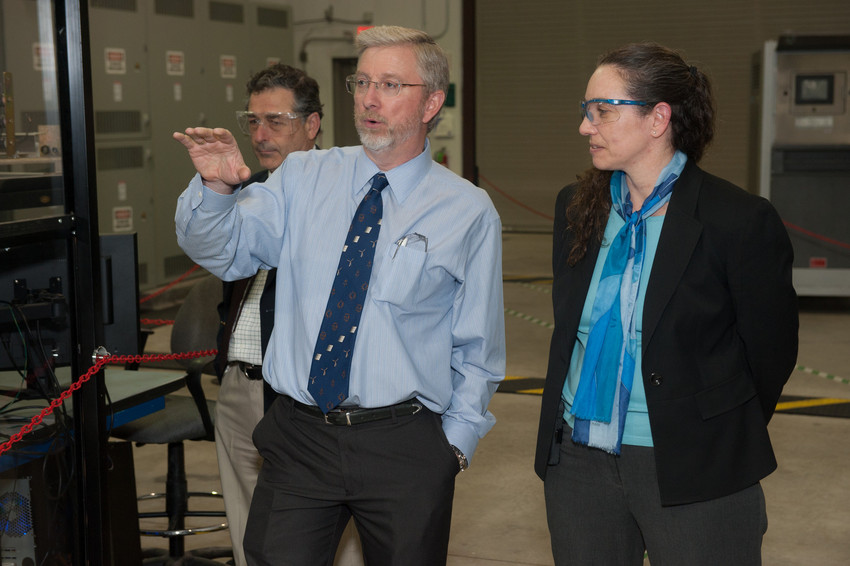On Friday, May 9, Patricia Hoffman, assistant secretary for the Office of Electricity Delivery and Energy Reliability at the U.S. Department of Energy, toured some of the facilities at the Engineering Research Center. Hoffman, who also delivered the College of Engineering Commencement address, visited the High Density Electronics Center and the National Center for Reliable Electric Power Transmission and met with a group of over 40 U of A graduate students.
At HiDEC, Hoffman was introduced the center’s unique capability to package and integrate electronic devices, working with a range of materials including ceramics, metal, polymer, organic materials and nanomaterials as applied to electricity generation.
NCREPT, a six-megawatt facility, can provide enough power to simulate the electrical grid and test safety measures, or it can be used to test power electronic devices. Researchers at this facility demonstrated the center’s capabilities for testing equipment connected to the power grid by administering a test of a solar inverter under abnormal grid frequency conditions. In addition, Hoffman got an overview of the center’s equipment, future initiatives and outreach efforts.
“We are so honored by Ms. Hoffman’s visit,” said John English, dean of the College of Engineering. “Her work with the Department of Energy is vital to the safety and security of the nation, and it is closely aligned with many of the research priorities in this college. We are grateful for this opportunity to show off a few of the university’s most impressive facilities, and we really appreciate the attention and advice she provided to our faculty and especially our students.”
On Saturday, May 10, Hoffman delivered the College of Engineering commencement address. She advised graduates to be open to new ideas and new skills while expanding their critical and analytical abilities. Hoffman spoke about the world’s need for engineering skills such as information security. She also recognized the accomplishments of students and faculty at the College of Engineering, mentioning the Arkansas Engineers Abroad group’s Belize project and the civil engineering department’s work on 3D modeling of tornadoes.
“From my perspective,” Hoffman concluded, “the United States will be investing in our infrastructure, enabling advanced manufacturing, developing our energy resources, and is poised to solve the world’s cyber and information security problems.” She encouraged the engineering graduates to take advantage of these opportunities to “electrify” the world.
Contacts
Camilla Medders, director of communications
College of Engineering
479-575-5697,
